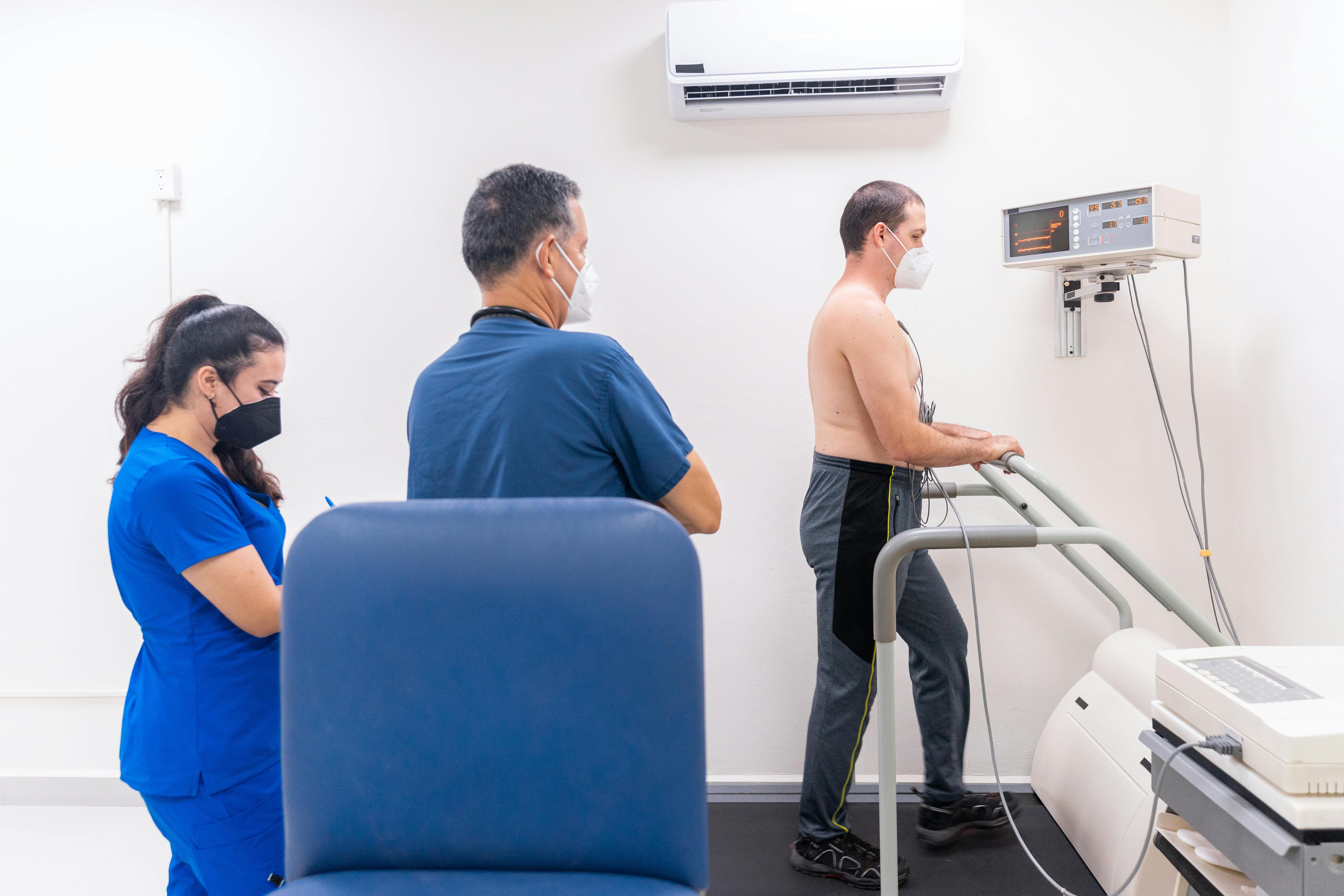Metabolic Stress Test vs. Cardiac Stress Test: What’s the Difference?

Stress tests are essential for evaluating how the body and heart perform under physical activity. Two widely used tests, the metabolic stress test and the cardiac stress test, help diagnose conditions and guide fitness or medical plans.
Understanding what a metabolic stress test is, the benefits of a cardiac stress test, and who might need these tests can help you make informed healthcare decisions. This guide provides a complete overview of both tests, their benefits, and how they differ.
1. What Is a Metabolic Stress Test?
A metabolic stress test measures your body’s ability to use oxygen and produce energy during exercise. It focuses on your metabolic performance, helping identify how well your body supports physical activity.
Metabolic exercise test benefits include:
- Detecting metabolic inefficiencies that limit endurance or performance.
- Creating personalized fitness programs to improve energy use.
- Identifying underlying conditions like exercise-induced asthma.
2. What Is a Cardiac Stress Test?
A cardiac stress test evaluates heart function under physical or simulated stress. It’s often used to detect heart problems that don’t appear when the body is at rest.
Cardiac Stress Test Benefits include:
- Identifying coronary artery disease early.
- Monitoring recovery after heart surgery or a cardiac event.
- Helping determine if the heart is safe for physical activity or surgery.
3. Where Are These Stress Tests Performed?
Both stress tests require specialized environments and trained professionals to ensure accurate results.
Metabolic stress tests are usually conducted in sports labs, fitness clinics, or hospitals equipped with gas analyzers and treadmills.
Cardiac stress tests are performed in hospitals or cardiology clinics with ECG and imaging systems.
Choosing the right location depends on your test type and health goals.
4. When Should You Get a Metabolic Stress Test?
A metabolic stress test is ideal for improving fitness or identifying metabolic issues. It’s especially helpful for athletes or individuals struggling with exercise-related fatigue.
You may need this test if you:
- Want to enhance performance through better energy efficiency.
- Experience breathing difficulties during workouts.
- Seek personalized recommendations for weight loss or fitness.
Who needs a metabolic stress test? Anyone looking to optimize their exercise capacity or address physical limitations.
5. When Is a Cardiac Stress Test Necessary?
A cardiac stress test is critical for diagnosing heart-related problems or evaluating your heart’s capacity for physical activity.
This test is recommended if you:
- Have symptoms such as chest pain, dizziness, or irregular heartbeats.
- Are recovering from a heart attack or preparing for surgery.
- Need to assess your heart’s ability to handle a new fitness program.
The benefits of a cardiac stress test include identifying heart disease early and preventing complications.
6. Which Conditions Can Be Diagnosed With a Metabolic Stress Test?
A metabolic stress test is designed to identify conditions that affect your metabolism and exercise performance. By analyzing oxygen and carbon dioxide levels, this test uncovers hidden metabolic problems.
It can diagnose:
- Exercise-induced asthma.
- Chronic fatigue caused by poor energy use.
- Metabolic disorders that reduce physical performance.
Knowing what a metabolic stress test is can help you address these issues and improve fitness.
7. Which Heart Problems Can a Cardiac Stress Test Detect?
A cardiac stress test helps detect heart conditions by monitoring how your heart reacts to stress. This test is vital for preventing severe cardiac events.
Common heart problems it can detect include:
- Coronary artery disease.
- Irregular heart rhythms (arrhythmias).
- Reduced blood flow or heart valve problems.
These benefits of a cardiac stress test make it a key diagnostic tool for heart health.
8. Why Are Metabolic Stress Tests Important for Athletes?
For athletes, a metabolic stress test provides critical insights into oxygen consumption and energy use, enabling them to optimize their performance.
Metabolic exercise test benefits for athletes include:
- Creating personalized training plans to boost endurance.
- Identifying fitness plateaus and areas for improvement.
- Preventing overtraining or injury through better recovery strategies.
9. Why Are Cardiac Stress Tests Critical for Detecting Heart Disease?
Detecting heart disease early can save lives. A cardiac stress test evaluates how well your heart pumps blood during activity and identifies potential risks.
Cardiac Stress Test Benefits include:
- Spotting blockages in heart arteries before they cause harm.
- Ensuring the heart is strong enough for physical exertion.
- Providing a clear picture of your overall cardiovascular health.
10. How Do These Tests Work?
Both tests involve physical activity, but their methods and focus differ significantly.
Metabolic Stress Test: Measures oxygen intake and carbon dioxide output using a mask during exercise.
Cardiac Stress Test: Uses ECG monitoring to observe heart rhythms and blood flow during exercise or simulated stress.
These tests provide complementary insights into your overall health.
11. Which Test Is Best for You?
The choice between a metabolic and cardiac stress test depends on your goals and symptoms.
A metabolic stress test is best for improving fitness or diagnosing exercise-related problems.
A cardiac stress test is ideal for detecting heart issues or ensuring cardiovascular safety.
Your healthcare provider can guide you toward the appropriate test for your needs.
12. Why Are Metabolic and Cardiac Stress Tests Different?
Although both tests evaluate your body’s response to stress, they focus on different areas:
Metabolic Stress Test: Measures energy production and oxygen efficiency.
Cardiac Stress Test: Evaluates heart function and blood flow under stress.
Understanding these differences ensures you choose the test that aligns with your health needs.
13. Who Needs a Metabolic Stress Test?
A metabolic stress test is recommended for individuals who want to enhance their fitness or identify metabolic issues.
It’s ideal for:
- Athletes looking to improve endurance and performance.
- Individuals with unexplained exercise fatigue or breathing problems.
- Anyone seeking a tailored fitness plan based on their metabolic needs.
14. What Are the Benefits of a Metabolic Exercise Stress Test?
The metabolic exercise test benefits are numerous and include:
- Enhancing workout efficiency by identifying energy use patterns.
- Detecting metabolic inefficiencies that hinder performance.
- Helping design a fitness plan tailored to your unique physiology.
- This test is an excellent way to achieve fitness goals more effectively.
15. What Are the Benefits of a Cardiac Stress Test?
The benefits of a cardiac stress test include:
- Detecting heart problems before they become severe.
- Monitoring recovery after a heart attack or surgery.
- Ensuring the safety of starting a fitness routine for at-risk patients.
- This test is critical for maintaining long-term heart health.
16. How to Prepare for These Tests?
Proper preparation ensures accurate results for both tests.
Wear comfortable exercise clothing and avoid heavy meals before the test.
Follow your doctor’s advice regarding medications or dietary restrictions.
Preparation differs slightly for each test, so always consult your healthcare provider.
17. What Happens During and After the Tests?
During the test, you’ll engage in physical activity while your body or heart is monitored. After the test, your results will be analyzed, and your doctor will recommend the next steps.
Both tests are safe, and recovery is typically immediate unless additional testing is required.
Conclusion
Understanding the differences between a metabolic stress test and a cardiac stress test helps you make informed decisions about your health. While the metabolic stress test focuses on fitness and energy efficiency, the cardiac stress test ensures your heart is functioning optimally.
Consult your doctor to determine which test is right for you and take a proactive approach to your health.
FAQs
- Which stress test is more accurate?
Each test is accurate for its purpose: metabolic tests for fitness and cardiac tests for heart health.
- What is the best test for stress levels?
A metabolic stress test is ideal for evaluating physical stress, while a cardiac stress test evaluates heart stress.
- What are metabolic stress symptoms?
Fatigue, shortness of breath, and reduced exercise capacity are common metabolic stress symptoms.
- Can athletes benefit from stress tests?
Yes, metabolic stress tests help athletes optimize performance, while cardiac tests ensure heart safety during intense training.
- How long does a stress test take?
Most tests last 30–60 minutes.
- Can a cardiac stress test be done without exercise?
Yes, medication can simulate exercise effects for patients unable to exercise.
- Do insurance plans cover these tests?
Most insurance plans cover stress tests when recommended by a doctor.
- Are these tests painful?
No, though they may feel physically demanding during exercise.
- Is fasting required for these tests?
Fasting is often required; your doctor will provide instructions.
- Do both tests require a doctor's referral?
Yes, a referral ensures the test is medically appropriate for your condition.
Medical Disclaimer:
This blog is for informational purposes only and is not a substitute for professional medical advice, diagnosis, or treatment. Always consult a qualified healthcare provider for any medical concerns.
Note: IndiBlogHub features both user-submitted and editorial content. We do not verify third-party contributions. Read our Disclaimer and Privacy Policyfor details.







